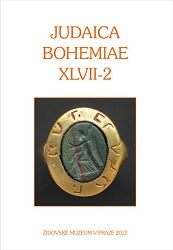Alois von Sonnenfels and the Blood Libel in the Early Enlightenment
Alois von Sonnenfels and the Blood Libel in the Early Enlightenment
Author(s): Ivo CermanSubject(s): Jewish studies
Published by: Židovské Muzeum v Praze
Summary/Abstract: When it comes to refutations of the blood libel, Czech historiography usually commemorates Prof. Tomáš Masaryk and his bold attempt to eradicate this superstition during the Hilsner Affair at the beginning of the 20th century. Nevertheless, Masaryk had a predecessor who has often been disregarded. It was at the beginning of the Austrian Enlightenment that the Jewish convert AloisWienner von Sonnenfels assaulted the pernicious blood allegation in the name of the universal law of love. Although his attempt has been largely forgotten, it holds a central place in the history of religious toleration in the Habsburg Monarchy. The aim of this study is to answer some elementary questions related to his polemical brochure Jüdischer Blut-Eckel (1753).2 I will endeavor to analyze Sonnenfels’ arguments and reconstruct the context in which his tract originated. It is not easy to find out what the motive of this work was, and whom Sonnenfels was addressing, as there was no blood libel trial in the Habsburg Monarchy at the time he was writing, and he himself does not give a clue to this mystery.
Journal: Judaica Bohemiae
- Issue Year: XLVII/2012
- Issue No: 2
- Page Range: 35-56
- Page Count: 22
- Language: English
- Content File-PDF

